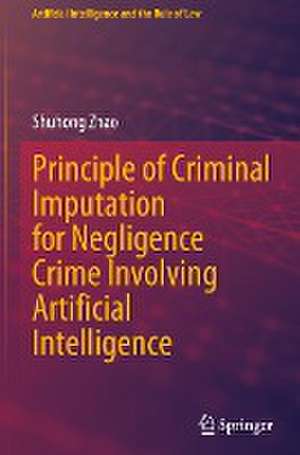Principle of Criminal Imputation for Negligence Crime Involving Artificial Intelligence: Artificial Intelligence and the Rule of Law
Autor Shuhong Zhaoen Limba Engleză Hardback – 25 feb 2024
This book provides an in-depth discussion of the theoretical and practical issues of criminal imputation for negligence crime involving artificial intelligence. Accordingly, this study combines
the imputation challenges brought about by AI with traditional criminal imputation theory and analyses imputation for negligence crime involving AI from three aspects: the basic principles, structure, and results of imputation for negligence crime involving AI. The traditional theory of imputation is discussed in detail. The readership is a group of people interested in this topic, including, in particular, interested laymen, undergraduate students and postgraduate researchers. The highlights of this book are it identifies the imputation challenges bought about by AI, reveals the theoretical and practical gap in the criminal imputation of negligent crimes involving AI, and provides an in-depth and creative ideas of criminal imputation for the negligent crimes involving AI.
Preț: 888.01 lei
Preț vechi: 1082.93 lei
-18% Nou
Puncte Express: 1332
Preț estimativ în valută:
169.92€ • 185.15$ • 143.18£
169.92€ • 185.15$ • 143.18£
Carte tipărită la comandă
Livrare economică 24 aprilie-08 mai
Preluare comenzi: 021 569.72.76
Specificații
ISBN-13: 9789819707218
ISBN-10: 9819707218
Pagini: 115
Ilustrații: IX, 115 p. 1 illus.
Dimensiuni: 155 x 235 mm
Greutate: 0.36 kg
Ediția:2024
Editura: Springer Nature Singapore
Colecția Springer
Seria Artificial Intelligence and the Rule of Law
Locul publicării:Singapore, Singapore
ISBN-10: 9819707218
Pagini: 115
Ilustrații: IX, 115 p. 1 illus.
Dimensiuni: 155 x 235 mm
Greutate: 0.36 kg
Ediția:2024
Editura: Springer Nature Singapore
Colecția Springer
Seria Artificial Intelligence and the Rule of Law
Locul publicării:Singapore, Singapore
Cuprins
Preface.- Chapter 1 Challenge of Criminal Imputation for Negligence Crime Involving AI to the Traditional Criminal Imputation Theory.- Chapter 2 Theoretical Preconditions of Criminal Imputation for Negligence Crime Involving AI.- Chapter 3 Imputation System for Negligence Crime Involving AI.- Chapter 4. Main Conclusions and Future Prospects.
Notă biografică
Dr Zhao Shuhong is a professor at the College of Criminal Law of Beijing Normal University, China. His research focuses on a wide range of criminal law science, including criminal law, such as corpus delicti and its elements, criminal responsibility, stages of committing a crime, sentencing for serious crimes, and criminology, such as domestic violence and sexual violence. Over the past decade, he has received prestigious research grants, including a grant to study sentencing for serious crimes from the Max Planck Institute for the Study of Crime, Security and Law and the Fritz Thyssen Foundation in Germany. He has published a considerable number of valuable academic articles in various prestigious journals in the field, which have become part of the teaching literature in China.
Textul de pe ultima copertă
This book provides an in-depth discussion of the theoretical and practical issues of criminal imputation for negligence crime involving artificial intelligence. Accordingly, this study combines the imputation challenges brought about by AI with traditional criminal imputation theory and analyses imputation for negligence crime involving AI from three aspects: the basic principles, structure, and results of imputation for negligence crime involving AI. The traditional theory of imputation is discussed in detail. The readership is a group of people interested in this topic, including, in particular, interested laymen, undergraduate students and postgraduate researchers. The highlights of this book are it identifies the imputation challenges bought about by AI, reveals the theoretical and practical gap in the criminal imputation of negligent crimes involving AI, and provides an in-depth and creative ideas of criminal imputation for the negligent crimes involving AI.
Caracteristici
Addresses the criminal risks that AI crimes pose to us today Discusses the theoretical and practical gap in criminal imputation for negligent crimes involving AI Provides the principles of criminal imputation for negligent crimes involving AI




